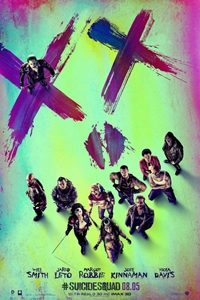 The Noble Villain:
The Anti-Heroes Rise in Suicide Squad
The Noble Villain:
The Anti-Heroes Rise in Suicide Squad
By Kaely Monahan
Allegedly, Suicide Squad did some reshoots after the lackluster audience response to Batman V Superman: Dawn of Justice. Whether or not those reshoots bettered the film is up for debate, but the final edit is satisfactory. It certainly flows much better than Batman V Superman. And it also has some surprising depth for a “shoot ‘em up” movie.
Directed by David Ayer and filled to the brim with star-studded talent, Suicide Squad takes the most iconic villains of the DC world and throws them into a loose gang manipulated by the U.S. government..
Will Smith plays the dry, anti-hero Deadshot. Margot Robbie is the demented yet sensual Harley Quinn; Jared Leto plays the Joker with a manic edge. His version of the character doesn’t conflict with Heath Ledger’s rendition; rather Leto’s Joker feels more insane whereas Ledger’s was darker and more depressing.
Viola Davis is a powerhouse presence as Amanda Waller who heads the squad. Her performance cannot be praised enough. While all the acting was strong in this film, Davis brought an edge and gravitas that is downright chilling. Her character is more frightening than anyone of the labeled “bad guys.”
Which brings us to one of the major themes in the film—what makes a villain? Ostensibly, the “villains” are the heroes Suicide Squad. Whether they want to be or not. We are meant to sympathize with them, embrace them, love them. A lot of time is spent humanizing Smith’s character, who is a father. It is his daughter who motivates him—and who gets him captured. She’s determined to see the good in him—even though he’s a hitman for hire. The lines between good and evil are thoroughly blurred with him.
Harley Quinn is an example of someone descending into mental illness. Once a psychiatrist she falls in love with the Joker and is willing to do anything for him—even though it’s clear he abuses her psychologically. There’s a whole film waiting right there to be explored and is only briefly touched upon in this film. But again, here is someone we can feel sympathy towards. She is manipulated and essentially tortured by the Joker. He makes her crazy and ultimately she is “more dangerous” than him.
The other members of the squad are also given brief backgrounds, and again each story is designed to manipulate your emotions. These are not good people. They murder and brutalize and commit heinous crimes. But you still feel for them.
Back to Davis’ character. She is cold, ruthless, and unstoppable. Her control over the meta-human villains is absolute, and she flaunts that power. Her cold brutality is even more frightening than the insanity of Harley. As Deadshot points out, there is a sort of code among thieves. Amanda Waller doesn’t subscribe to it. Sort of like Big Brother—or perhaps Big Sister—on steroids, Waller represents all the fears America has of its own government: surveillance, control, and creating a feeling of helplessness. Your life is not your own.
However, big government (and by extension, modern warfare, science, and technology) rub up against instinctual human fears: magic and the unknown.
The ultimate villain is the Enchantress—an ancient witch—played by Cara Delevigne. She represents nature and man’s inability to control it. Once worshiped by ancient humans, she is released on the world—by Mankind, or more accurately a female archeologist, bumbling about “where she shouldn’t be.” Read into that what you will.
Waller is determined to harness The Enchantress’ power, but she loses that control. (As in Jurassic Park, she didn’t respect the power of nature, and nature lashes back as an all-consuming, unstoppable force.)
The Enchantress laments the loss of human worship and decides to take over the world by creating a magical machine. The motivation behind this being humans now worship machines.
On the surface Suicide Squad is a romp in the dirt with some diverse characters thrown together in a misadventure. But dig a little deeper and there are interesting questions to explore.
The film seems to hesitate to cast its anti-heroes as true villains—even though in truth they are rather despicable. It really makes you question what a villain is—and perhaps what is our society’s definition of a bad guy. (Is it good to sympathize with killer sociopaths?) Still humor and character building go a long way of humanizing even the worse of society, and in the end Suicide Squad does just that. And while it is a bit clumsy in its storytelling and seems to veer all over the place in tone, it is still more entertaining than the lamentable Batman V Superman.
- Kaely Monahan is a journalist, graduate of City University London and the creator of Popcorn Fan Film Reviews. Follow her @PopcornFans and @KaelyMonahan.









